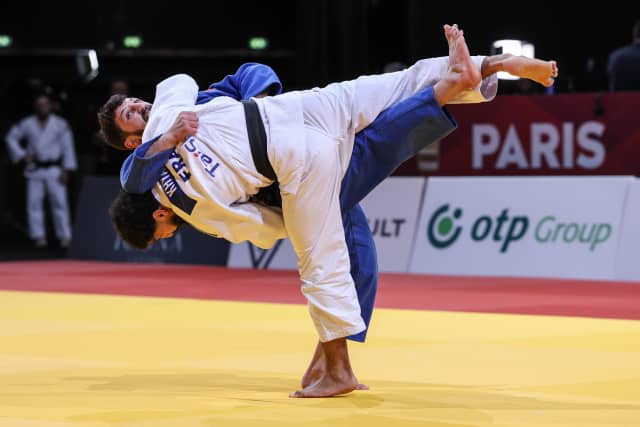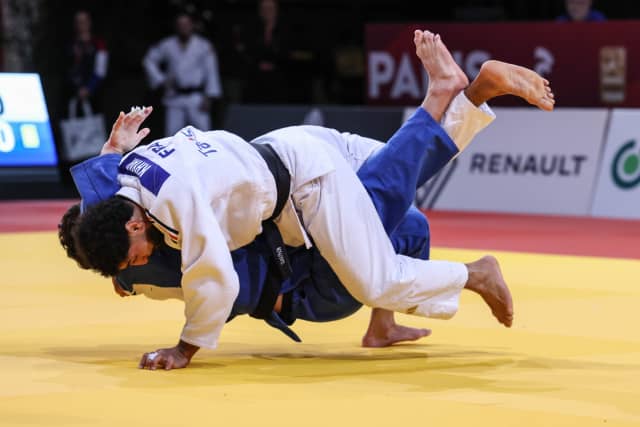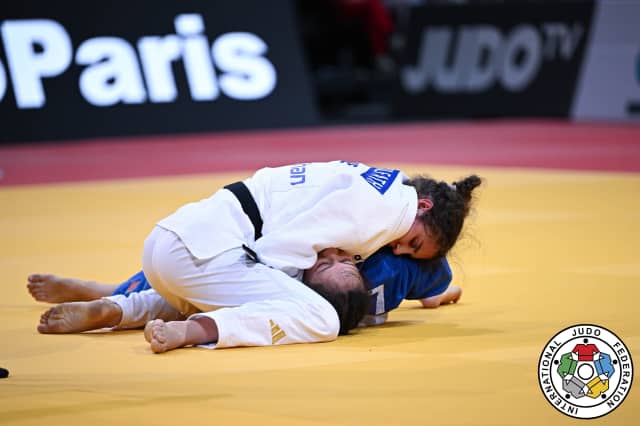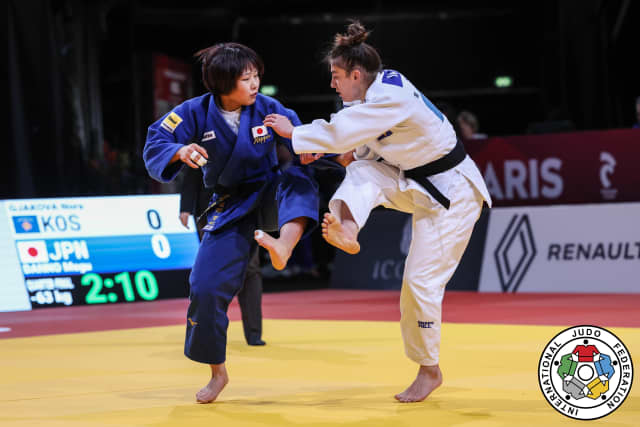In February 2025 the Paris Grand Slam opens the season but it also opens a new Olympic cycle. Of course there was Tokyo at the end of 2024, always incredible, but that felt like the close of a huge year and so Paris carries the mantle and delivers the feeling that we are entering a new phase.
Kicking off the new 2025 World Judo Tour! 🥋🔥
— Judo (@Judo) February 1, 2025
Follow all the action on https://t.co/5YYXyE0nko 💻#JudoParis #Paris #France #IJF #WJT #Judo #Sport pic.twitter.com/gXNc9K9vTM
On day one in Paris, the first 7 categories took to the mat, women up to and including the -63 kg category and men up to and including the -73 kg category. The pace was fast and the spectators in the already full Bercy could enjoy big ippon throws and a taste of the new rules.
There were so many moments in the morning session worth revisiting. We saw 2012 Olympic champion Lasha Shavdatuashivili take the junior world number one, Vusal Galandarzade (AZE) apart in their first -73 kg contest before the Georgian looked set to disappoint the crowd, leading against Gobert (FRA) by a yuko until the very last second of the contest. The Frenchamn didn’t accept the situation though and hunted a score right to the end and he suceeded! The spectators unleashed a roar for his waza-ari but it was quieted quickly as the score was downgraded, leaving a yuko each for white and blue as they went into golden score. Gobert then made a decision and threw Shavdatuashvili again, after only 12 seconds of extra time, this time with a powerful uchi-mata, earning himself a waza-ari and a place in the quarter-final against Ahadov (UZB). That fight, he did not win, Ahadov edging the tactical play.
Aside from the French interest, it should be noted that 3 of the 4 top seeds reached their respective semi-finals in the -73 kg category. Only Makhmadbekov (UAE) was usurped, the Portuguese junior world medallist beating him in the round of 16. Kvantidze (POR) won his quarter-final too but the semi-final was a step too far. He lost to Ahadov who moved forward to face Akil Gjakova, not the occupier of pole position after the draw.
Lombardo (ITA), who was the number one seed, fought his way through the field with great determination but in the semi-final he met the 2018 Paris winner, Gjakova. The Kosovan caught the Italian with a well planned sumi-gaeshi for waza-ari with a minute to go and he held the score comfortably to reach another Paris final.
Gjakova's second round win against Jean (FRA):
Oh la la 🇽🇰
— Judo (@Judo) February 1, 2025
Follow all the action on https://t.co/5YYXyE0nko 💻#JudoParis #Paris #France #IJF #WJT #Judo #Sport #RoadToLA2028 pic.twitter.com/BAkLzxJ2PY
At -66 kg we saw Nozadze (GEO) and Khyar (FRA) utilising some of the new gripping rules to allow them an extra layer of creativity anf freedom in their already wild styles of judo. They attempted pick-ups without the worry of exact placement, gripping the belt and just below, gaining enough purchase for some exciting near-misses. They tumbled with gymnastic excellence, always on the attack and eventually Khyar lit up the arena with a huge ippon throw. He seems to have taken to the new rules well, much to the delight of his coaches and the spectators.
Khyar carried the energy of the spectators with him but he made a mistake in the semi-final against Pashayev (AZE), losing by ippon, his ko-uchi-gari countered cleanly.
Judo values and professionalism win! 🇦🇿
— Judo (@Judo) February 1, 2025
Follow all the action on https://t.co/5YYXyE0nko 💻#JudoParis #Paris #France #IJF #WJT #Judo #Sport #RoadToLA2028 pic.twitter.com/Q0X3zShVZO
Both men smiled, Khyar apprecaiting the skill and accepting his defeat, Pashayev relieved and satisfied with his performacne so far. It was an elegant moment between two great fighters. Khyar dropped into the bronze medal contest to face Pashayev’s teammate, Yelkiyev. The other bronze would go home with either Chopanov (IJF) or Margvelashvili (GEO), the 31-year old Tokyo Olympic silver medallist.
At -48 kg Babulfath, the 18 year old Olympic medallist, Kondo and Koga of Japan and home favourite Boukli (FRA) strode confidently toward the final block. Technique and determination set them apart from the rest and offered the arena full of judo fans a superb display of dominance. Boukli’s win over Laborde (USA) by osae-komi was particularly well applauded, of course; a semi-finalist for the home team. The French Olympic and world medallist continued her run by beating Wakana Koga (JPN) in the semi-final by a single yuko. She raised her arms in victory and received the appreciation of the audience. With Koga into the first bronze medal contest, Kondo would still give Japan a chance at gold but Boukli is not likely to move aside easily.
In the -63 kg category, two Olympic champions could be found from the weight below. Nora Gjakova (KOS), the 2021 -57 kg champion, and Rafaela SIlva (BRA), the 2016 title holder, entered the Paris Grand Slam to meet new challenges. It is a brave way to start the year especailly as they arrived in the same quarter of the draw. The Kosovan passed Drid (FRA) and Oberan (CRO) but was beaten in the quarter-final by Danno (JPN), the same judoka who dispatched Silva in the round of 16. 23-year old Danno, 2024 Tokyo Grand Slam silver medallist, had an almost insurmountable task ahead of her at the beginning of the day but she removed both Olympic champions from the running.
Danno’s excellent start to the tournament was short-lived. Manon Deketer, driven hard by the enthusiasm of the spectators, proved that regardless of previous wins in a category, each contest stands alone and no-one should be discounted. The 2022 world medallist beat Danno by shime-waza, a hard fought exchange in which the Frenchwoman refused to let her opportunity go. Her reward was a place in the final, her first Paris final. Deketer took bronze at the Bercy in 2021. Danno would have to fight double junior world champion Melkia Auchcorne for bronze on the latter’s home soil; it would not be easy. The other bronze medal would belong to either the Kosovan Olympic champion or the Netherlands’ young world champion Joanne Van Lieshout.
The -57 kg category saw both top seeds relegated at the quarter-final stage, Perisic (SRB) losing out to Velozzi (FRA) and Liparteliani (GEO) losing out to Fuchida (JPN). However it was Timna Nelson Levy who really capitalised on the draw and the early exits of the highest ranked of the group. She threw Fuchida twice in their semi-final and the second throw was a clear ippon, a decisive counter, ko-soto-gake.
Nelson Levy, feeling good after a great morning, would face Martha Fawaz in the final. The young Frenchwoman opened her tally of World Judo Tour medals in 2024 and looks set to double down in 2025. Bronzes would be fought for by Mokdar (FRA) and Fuchida (JPN) on the top half, Liparteliani (GEO) and Velozzi (ITA) on the bottom half.
Asvesta of Cyprus stepped up a level in Paris. She has been climbing the -52 kg rankings since the beginning of the Paris 2024 qualification period began but in this new cycle she is already labelling herself as a real contender. She threw Bayanmunkh for ippon in just 11 seconds in round two, with an unusual style of seoi-otoshi. in her next contest, against Van Krevel (NED), she controlled the hands perfectly, te-waza as a counter bringing the only score of the contest to the Cypriot’s side of the scoreboard. The semi-final against Fujishiro (JPN) was also not a done deal. Asvesta gave it everything but was eventually beaten, dropping into the bronze medal contest where she would face strong Spanish opposition in the final block. Asvesta has laid claim to her place in the afternoon sessions of the season ahead and regardless of her final result in Paris, her intentions are clear.
Elsewhere in the group, Krasniqi looked set to uphold her number one status on the draw but was held down by Omori (JPN) in the semi-final, delivering the Japanese team a guaranteed gold. Krasniqi, the Paris 2024 Olympic silver medallist, would fight Bishrelt (UAE) for one of the bronze medals, the other going to either Leiva Sanchez (ESP) or Asvesta (CYP).
In the lightest of the men’s categories there was supposed to be a host country rivalry between number one seed Cedric Revol and number two seed Romain Valadier Picard. Both reached semi-finals, Revol teaching the next generation, in the shape of Enzo Jean, that he is not ready to step down just yet, and Valadier Picard showing great focus and throwing ability to pass both his JUA opponents. However in the semis, Revol slipped up where Valadier Picard did not. The former would fight for bronze against Boturov (UZB), beaten by Valadier Picard in their quarter-final. The latter would compete for gold against Sekimoto of Japan.
The final block was now designed and after a break in competition to regroup and refresh it would be time to crown the first 7 grand slam champions of the year. AT 5pm local time, the Bercy will erupt again and we can’t wait.










